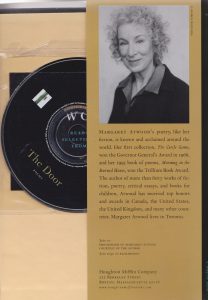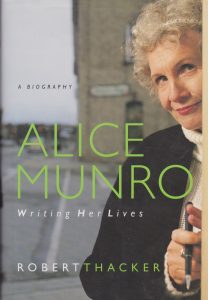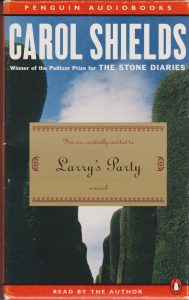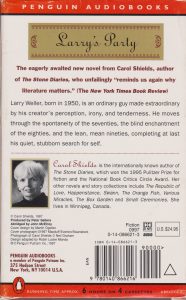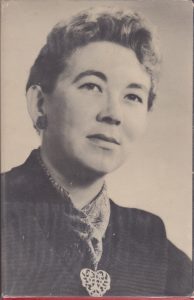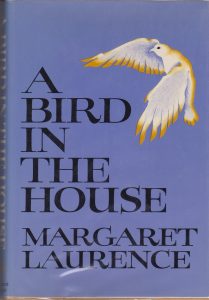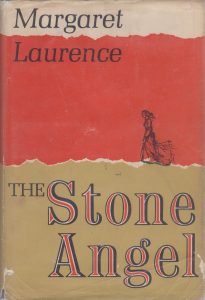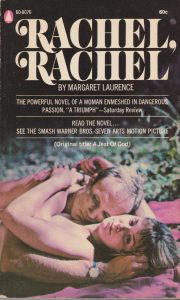(Atwood writes a ‘plainer, flatter’ prose syntax and, IMHO, is and was, first and foremost, a poet; this rare US ed. features a CD of her reading her new poems; which is why I featured her in Inside Poetry, 2nd ed. That said, she can be a provocative writer, perhaps best manifested by A Handmaid’s Tale)
One ‘deeper’ writer (for me) would be Alice Munro, the Nobel Prize winner of world-acclaimed short stories. Munro opened up the possibilities of more common, conventional female sensibilities sans political agendas. She writes wonderful, complex free-flowing syntax and is bottomless in her insights into us all, and, especially, women. She is a prose master and has, astutely, been compared to Chekhov.
I just finished listening to Carol Shields impressively reading her own thoroughly entertaining novel Larry’s Party (a rare cassette audiobook set). In terms of empathy, she understands men pretty well, especially their inexplicable remoteness and depths largely unknown to themselves and to forever analyzing women.
The first of the book centers on Larry from his twenties on, but does dip into his family background, including parents and sister. On his honeymoon while at Hampton Court, he falls in love with mazes which is the main symbolism of the book right up to the end. The mazes are Larry/Larry’s.
A couple of divorces and one son later, he moves from Winnipeg to Chicago with time in Europe, culminating in a final move to Toronto where he has the memorable, truly ice-breaking party that moves him toward ‘final’ happy resolution. The guests include his two ex-wives, his current girlfriend, and his cynical sister.
Along the way, Shields presents the various women in his life as influential background characters, and then on the home stretch, at the party, the women attendees all ‘break out’ in occasionally intersecting monologues revealing a wide range of female characters, motives, analyses, behavior and sensibilities; so that this turns out to be, in the end, a book with realistic restless women characters, not simply about a confused guy, his world, and life. In fact, the book is overflowing with many insightful truths and truisms about relationships and male and female psychology.
Atwood would never adopt such a broad, benevolent vision of the sexes, particularly of men. Munro has, of course, been confined to shorter fiction and never taken on such a large novel canvas as Shields, questioning gender roles, political correctness, and unbridled female thinking in depth, all from a male’s point of view. In that, I submit, is the uniqueness and achievement of Shields’ approach and style. Her presentation of reality is largely subjective, but balanced at the same time. Above all, she plays fair and never leans too obviously to a limited bias or political as does Atwood in her best-known book.
Back in the 1980s, her stories were a revelation to me and I suggested a couple (“Fragility” and “Invitations”) for anthologies I was then working on. They were thoughtful, imaginative, and unlike any other Canadian writer then. After that, her major novels followed including The Republic of Love, The Stone Diaries, and Swann.
Too often, Atwood has been too easily/unanimously granted the status of our top Canadian writer today. So I think it was good and just that Munro received the Nobel Prize accolade she so richly deserved for her outstanding, specialized oeuvre. But I also think that Shields has not been given her full due as a truly gifted, sensitive, and mentally-stimulating fictional prose writer.
And lest we forget, before the 2000s, the notable achievements and Manawaka novels of Margaret Laurence who ushered in the above modern women writers in her wake. Her deep characterizations of women and girl protagonists were the first realistic ones in 20th century Canadian fiction.

